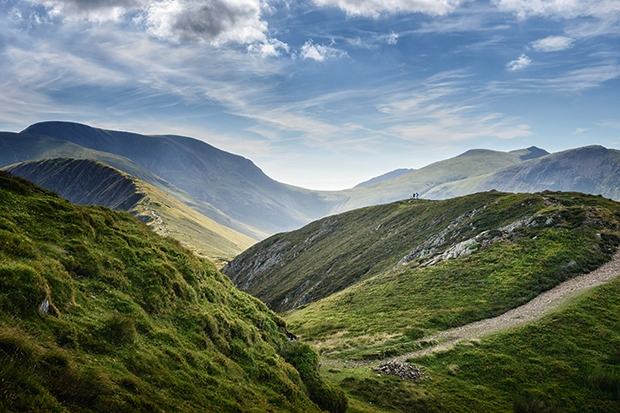Petrichor. Coined as recently as 1964 but redolent of Eden onwards, the word appears in neither of these volumes but they are suffused with it. In denoting that tang which arises after rain has fallen upon dry ground, petrichor can make a stroll through park or hillside headier than any parfumier’s establishment. Down the centuries, as people moved into populous cities, such relish of open, green space has become all the more acute, with one man’s wild meadow another’s ‘development opportunity’.
With a steadily lengthening shelf of books that are threnodies for seaside holidays, the Routemaster bus, vinyl records, the transplanted London Bridge and now public parks, Travis Elborough is becoming a latter-day Alan Bennett. Let loose in an array of reference libraries, he summons many a curious fact (such as fashions in beards) from the shelves, which makes for a rich narrative. Essentially chronological and based upon England, with excursions to Versailles and Manhattan, his study lights upon places as the emblem of an era. After lively sections on earlier cavortings (stand up, Pepys), he dwells upon an increasingly civic spirit with the 1830s’ recognition that ‘progress wasn’t always that progressive’, for cramped conditions spread disease and dismay. Of course some, such as the academic Andrew Ure, asserted that child labour was so far from dangerous that ‘the work of these lively elves seemed to resemble a sport’; not ready to leave the matter there, Ure claimed that, mills being better ventilated than Parliament, the latter had no business in making legislation affecting the former.
How much more cheering to read of his contemporary John Claudius Loudon. Publisher of an early gardening magazine, he envisaged green belts, a passion which saw him unfazed by the loss of an arm and two fortunes. ‘He was first drawn to his wife and amanuensis, Jane Webb, after reading her novel The Mummy, a tale of Gothic science fiction set in a 22nd century where the fields were tilled by steam-powered ploughs and houses could be moved from place to place on rails.’
Such alluring detail fills every page, so much so that they cannot be taken quickly. A particular delight is the account of Central Park. This owes its existence not only to a man, Frederick Law Olmsted, who was as reckless as Loudon, but to a convalescent tour of England with his brother. During a chance, bun-buying encounter with a forthright Birkenhead baker, they heard American flour denounced as inferior to French and were well-nigh ordered to visit the town’s tremendous new park, designed by Joseph Paxton. The baker even offered to look after their rucksacks while they did so.
Without that serendipitous inspiration, Manhattan would look far different — as would all the American towns which duly hankered to rival that great, almost bucolic park (recently improved by restrictions on the automobiles which Olmsted never imagined). Although paying tribute to many worthies, Elborough engineers a place for the louche who often go hand in hand — and more — with wartime. He gives space, naturally, to the Regent’s Park of Elizabeth Bowen’s novels but overlooks a novelist her equal: C.H.B. Kitchin’s posthumous, London-set A Short Walk in Williams Park (1971) takes in parks real and otherwise for a curious, dramatic tale which turns around a retired businessman who ‘loved the moments of increasing lethargy — the astral body half emerging from the physical — when moral problems dissolve into an etheric sensuality and even the inner mathematics of the brain transform themselves into purple and pink anemones or perfume the consciousness with hyacinths and carnations, — when a small cloud passing over the sun suggests images altogether unsorted by the optic nerve, and the quiver of a breeze against one’s hand cheers the self-doubting soul with a caress such as only a lover can give’.
A fit summary of parks’ delight — everybody’s personal property — for centuries to come, if they survive. One might regret that Elborough’s prose has suffered editoritis, such as ‘the writer William Makepeace Thackeray’ (oh, that one!); and yet ‘recurring leitmotif’ gets through, along with such clumsinesses as ‘since before’. Startlingly, the use, and sales, of a chockful book are diminished by its lacking an index. This could include: ‘158, Checker, Chubby — his Twist likened to Paxton’s glasswork.’
Less outlandish in metaphor but as passionate, Peter Waine and Oliver Hilliam’s essays — wonderfully illustrated, as heavy as a rucksack — range across such topics as the coast, litter, roaming and villages to form a compact history of the past 150 years. Celebratory in tone, with an emphasis upon such bodies as the National Trust, their book ends on a hortatory note: we need such vigilance and wisdom as shown by The Spectator (a high proportion of index entries). Yes, petrichor should alleviate all those, in Elborough’s phrase, ‘town-planning conferences heady with the smell of whiteboard marker pens’.






Comments